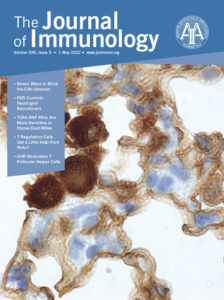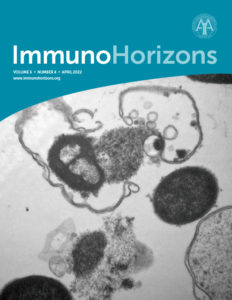Christopher C. Goodnow
Garvan Inst. of Med. Res., Australia

Christopher C. Goodnow, Ph.D. (AAI ’96), Garvan Institute of Medical Research, Australia, is the recipient of the 2022 AAI-BioLegend Herzenberg Award. This award is given in recognition of his fundamental contributions in the field of B cell biology that have shaped our understanding of B cell tolerance and basic mechanisms underlying autoimmunity.
Dr. Goodnow has focused on B cell biology since his doctoral studies with Gustav Nossal (AAI ’75) and Antony Basten (AAI ’76), during which he produced one of the first immunoglobulin (Ig) transgenic mouse lines (MD4) for the study of B cell tolerance. Using a well-studied soluble antigen, hen egg lysozyme (HEL), he made a series of mouse lines that expressed HEL as a soluble or membrane-bound autoantigen. Intercrosses of these mice led to a molecular description of anergy as a mechanism of tolerance to soluble autoantigens and helped to define the mechanism of deletion mediated by membrane-bound autoantigens. The MD4 transgenic mice have since been used by many laboratories around the world in studying various aspects of B cell biology.
As an independent faculty member, Goodnow further described the concept of immune checkpoints as a sequential process to restrain self-reactive lymphocytes. He also pursued large-scale genetic analysis of immune cell development and autoimmunity using ENU mutagenesis. These studies revealed the function of many critical regulators of immunity, including CARD11, THEMIS, and DOCK8. The ROQUIN1 gene was shown to be essential for restraining T follicular helper cell function, and mice and humans with mutations in Roquin suffer severe lupus-like autoimmune disease.
More recently, Goodnow and his team have described a new tolerance mechanism by which anergic B cells in the germinal center can undergo continuing mutation to evolve away from self and towards foreign reactivity, a process termed “clonal redemption.” Goodnow has also provided evidence for the role of de novo somatic mutations in autoimmunity. By performing single-cell sequencing of 170 lymphoma-associated genes, Ig repertoire analysis, and antibody peptide sequencing on B cells and serum antibodies from a patient in the early and late phases of developing Sjogren’s syndrome, he linked a de novo mutation in KLHL90P with the outgrowth of a pathogenic autoantibody producing clone.
Jason G. Cyster, Ph.D. (AAI ’97), professor, HHMI, University of California, San Francisco, says, “Chris has repeatedly changed the way we think about the field of B cell biology and autoimmunity. His work is central to all immunology textbooks…. Beyond the truly remarkable breadth of his achievements in advancing the field of immunology, Chris has made numerous leadership contributions that have positively impacted the training of hundreds of immunologists in Australia and around the world. Chris is known as a charismatic and inspiring leader and an unbeatable person to work with.”
Goodnow began his doctoral studies at Walter and Eliza Hall Institute and completed them at the University of Sydney. He then joined the faculty of Stanford University Medical School and the Howard Hughes Medical Institute. In 1997, he became a professor and the director of the Medical Genome Centre at Australian National University, leading its development into the Australian Phenomics Facility. He moved to the Garvan Institute of Medical Research in 2015 and is currently the executive director, The Bill and Patricia Ritchie Foundation Chair, and head of the Immunogenomics Laboratory. He also is a professor and the director of the Cellular Genomics Futures Institute at the University of New South Wales in Sydney.
Goodnow was the 1998 recipient of the AAI-PharMingen (now AAI-BD Biosciences) Investigator Award. Among his many career honors, he is a member of the National Academy of Sciences and a fellow of the Royal Society and the Australian Academy of Science. Goodnow has received the William E. Paul Memorial Award from the Foundation for Primary Immune Diseases, the GlaxoSmithKline Award for Excellence in Medical Research, and the Gottschalk Medal from the Australian Academy of Science.
Goodnow has served AAI as a member of the Program Committee and as a major symposium chair and speaker at the AAI annual meeting.



